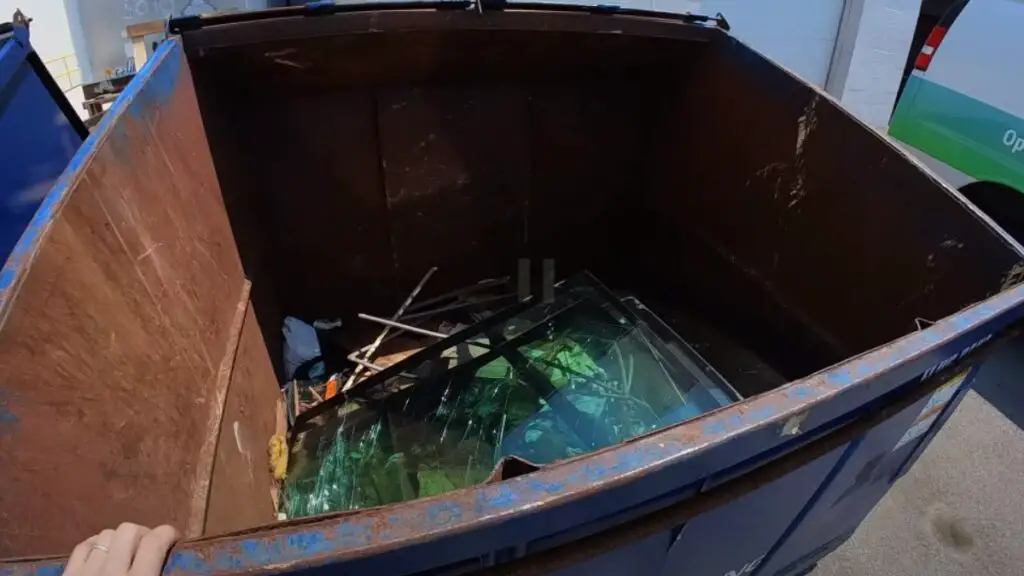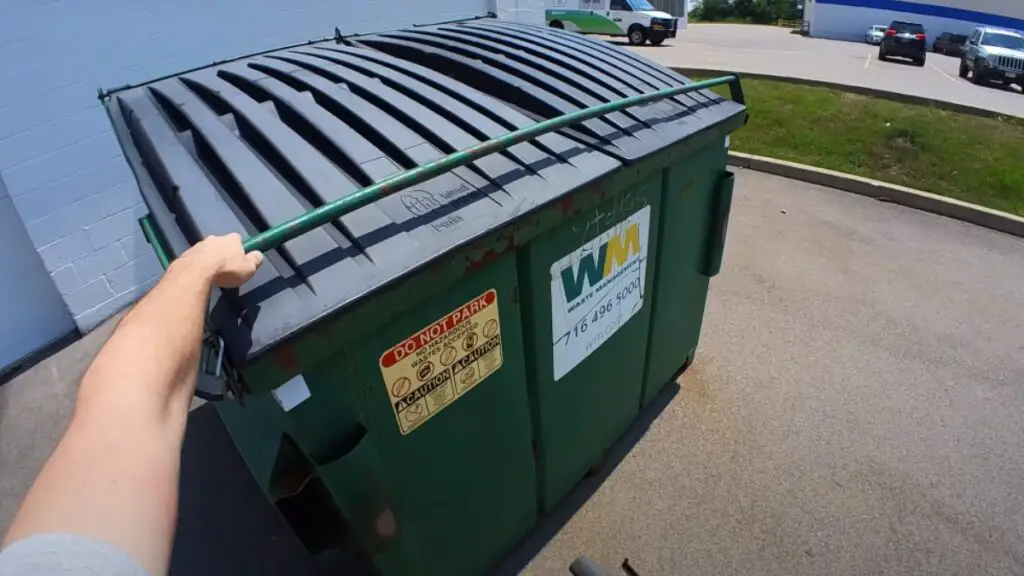Not many people are aware that each year, Vermont generates about 1,200 pounds of waste per person, much of which is still usable.
More Vermonters are embracing an eco-conscious lifestyle by dumpster diving to rescue discarded items, reducing waste and promoting sustainability.
In this article, we will discover the legalities, best locations, and potential earnings for dumpster diving in the Green Mountain State.
Let’s begin!
Dumpster Diving in Vermont

Vermont offers a fascinating opportunity for dumpster diving, with its diverse urban centers and shopping areas.
Montpelier, the state capital, and vibrant cities like Burlington and Rutland are home to many shopping centers.
These centers offer a wide array of discarded items, which is waiting to be discovered and appreciated.
Each year, the average American discards approximately 4.4 pounds of trash daily, a portion of which is reusable goods that end up in dumpsters.
This equates to an astonishing 1600 pounds of trash per person, annually.
Vermont, with a population of approximately 623,000, hence, could have nearly 1 billion pounds of waste per year.
Dumpster divers can find usable items including clothes, furniture, and occasionally, electronics in good condition; with a discerning eye.
Is Dumpster Diving Legal in Vermont
Dumpster diving isn’t explicitly prohibited under Vermont law, but it’s not an entirely risk-free activity.
The act of dumpster diving can trespass on private property, which is against the law in Vermont.
The key factor here is whether the dumpster is on private or public land.
If it’s on private land or if the dumpster is marked as private property, diving could lead you to trespassing charges.
Also, if the dumpster is on public property, if it’s specifically closed, locked, or marked as no trespassing, diving could also lead to legal consequences.
It is also illegal in areas with explicit signage or that require crossing barriers or accessing locked enclosures.
So, violators of trespassing may be subject to penalties, such as fines or imprisonment, depending on the severity of the offense.
Is Dumpster Diving Illegal At Night in Vermont
In the state of Vermont, there are no specific laws prohibiting dumpster diving, regardless of the time of day or night.
However, you should note that if the dumpster is on private property, one may be accused of trespassing.
Conducting such activities at night can potentially raise suspicions and lead to police involvement.
As of 2011, the Vermont Supreme Court ruled that trash is not private once it is thrown away, which theoretically allows for dumpster diving.
However, the practice carries potential risks, including violation of local littering, trespassing, or health and safety regulations.
Overall, dumpster diving isn’t technically illegal, engaging in this activity, especially at night, carries certain safety risks.
Best Places for Dumpster Diving in Vermont
Vermont offers ample opportunities for dumpster diving, thanks to its dedication to sustainability and recycling.
So, the key locations to explore include Burlington, Montpelier, and Rutland.
Burlington, is the largest city in Vermont, which offers substantial dumpster diving potential due to its variety of stores and markets.
It’s estimated that Burlington businesses discard approximately 18,000 tons of organic waste annually, some of which is perfectly usable goods.
Interesting places to explore include local grocery stores, specifically their produce sections, which often discard items nearing their sell-by dates.
Next is Montpelier, the state capital known for its “zero waste” initiative.
It’s a haven for dumpster divers seeking unique finds; with 45% of its waste currently diverted from landfills
The city’s annual ‘Green Up Day’ also generates a significant amount of discarded items, perfect for those looking to repurpose or recycle.
Lastly, Rutland with its bustling flea market scene proves to be a goldmine for dumpster divers.
The discarded treasures from these markets can often be found in nearby bins or dumpsters.
How Much Can I Earn from Dumpster Diving
Experienced dumpster divers in Vermont can make several hundred dollars per month, although earnings can vary depending on different factors.
This largely depends on factors such as location, the time spent diving, and the type of items found.
For example, dumpster diving for recyclable items like aluminum cans could earn you up to $0.05 per can in Vermont.
If you’re able to collect 1,000 cans a week, that’s $50 a week or $200 a month.
Besides recyclables, finding items in good condition that can be sold at yard sales, flea markets or online forums could boost your earnings.
Best Time for Dumpster Diving
The optimal time for dumpster diving varies depending on the specific objective of the diver.
If you’re seeking perishable items such as food, you should dive shortly after store closing times, which can range from 9:00 PM to 11:00 PM.
This ensures that you access the discarded items while they are still fresh.
Retail stores generally unload their unsold goods early in the morning, usually between 4:00 AM to 6:00 AM, making this period ideal for finding non-perishable items.
Dumpster diving in Vermont is regulated by state law. To avoid penalties, it is important to comply with these regulations.
What Kinds of Items Should I Pick?
Knowing what is valuable and safe to pick can greatly impact your experience when engaging in dumpster diving.
Firstly, you should prioritize sealed, non-perishable food items, as they have a longer shelf-life.
According to the Food and Agriculture Organization, 1.3 billion tons of food is wasted annually; a fraction of it is still good to consume and ends up in dumpsters.
Furniture is another great find, with 9.7 million tons discarded in the US alone per year. However, be cautious of upholstered items due to infestation.
Electronic devices, especially those thrown out by businesses, can often be refurbished or salvaged for parts.
However, you should be aware that in 2016, 44.7 million metric tons of e-waste was generated worldwide, so responsible disposal is crucial.
Always avoid personal items or anything that may contain sensitive information.
So, if you are planning to dumpster dive at Idaho, Missouri, Wisconsin, or Minnesota; first you should check the state laws before going to your hunt.
Tips for Dumpster Diving
Dumpster diving, while unconventional, can sometimes yield surprising finds. However, it’s crucial to approach it safely and respectfully.
Here are some tips:
- Know the Law: Dumpster diving laws vary by location. In some places, it’s illegal, while in others, it’s merely frowned upon. You should do your research and respect local laws.
- Safety First: You should wear protective clothing to prevent injuries. This includes sturdy gloves, long sleeves, and durable pants.
- Use Tools: Also use a grabber or a stick to sift through items without touching them directly.
- Avoid Food: Unless you’re sure it’s safe, avoid dumpster diving for food. The risk of foodborne illnesses is high.
- Respect Property: If a dumpster is on private property or if there are signs prohibiting trespassing, it’s best to steer clear.
- Clean Up: At the end leave the area cleaner than you found it. This helps to maintain a positive image for other dumpster divers.

Frederick Perez is the founder of Scrape Dude. He loves exploring and finding hidden treasures in unexpected places. Frederick has been dumpster diving and gold panning for years, turning his hobby into our website to share his adventures. He’s known for his friendly advice and exciting stories, inspiring others to discover the joy in these unique hobbies. His expertise makes Scrape Dude a trusted and fun place to learn and explore.


